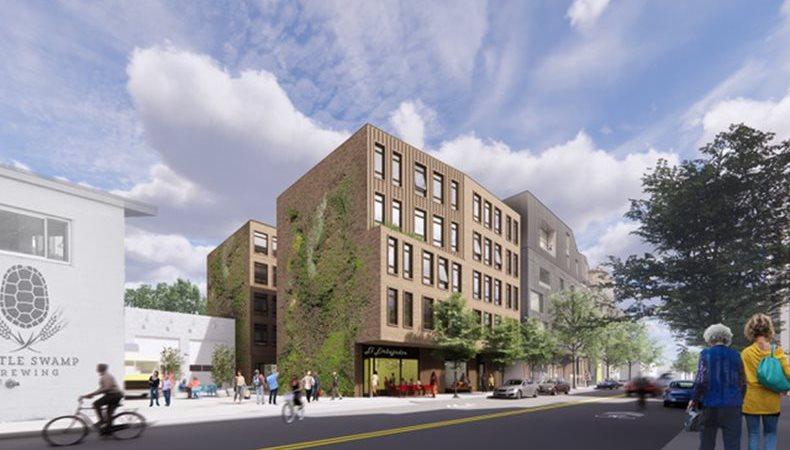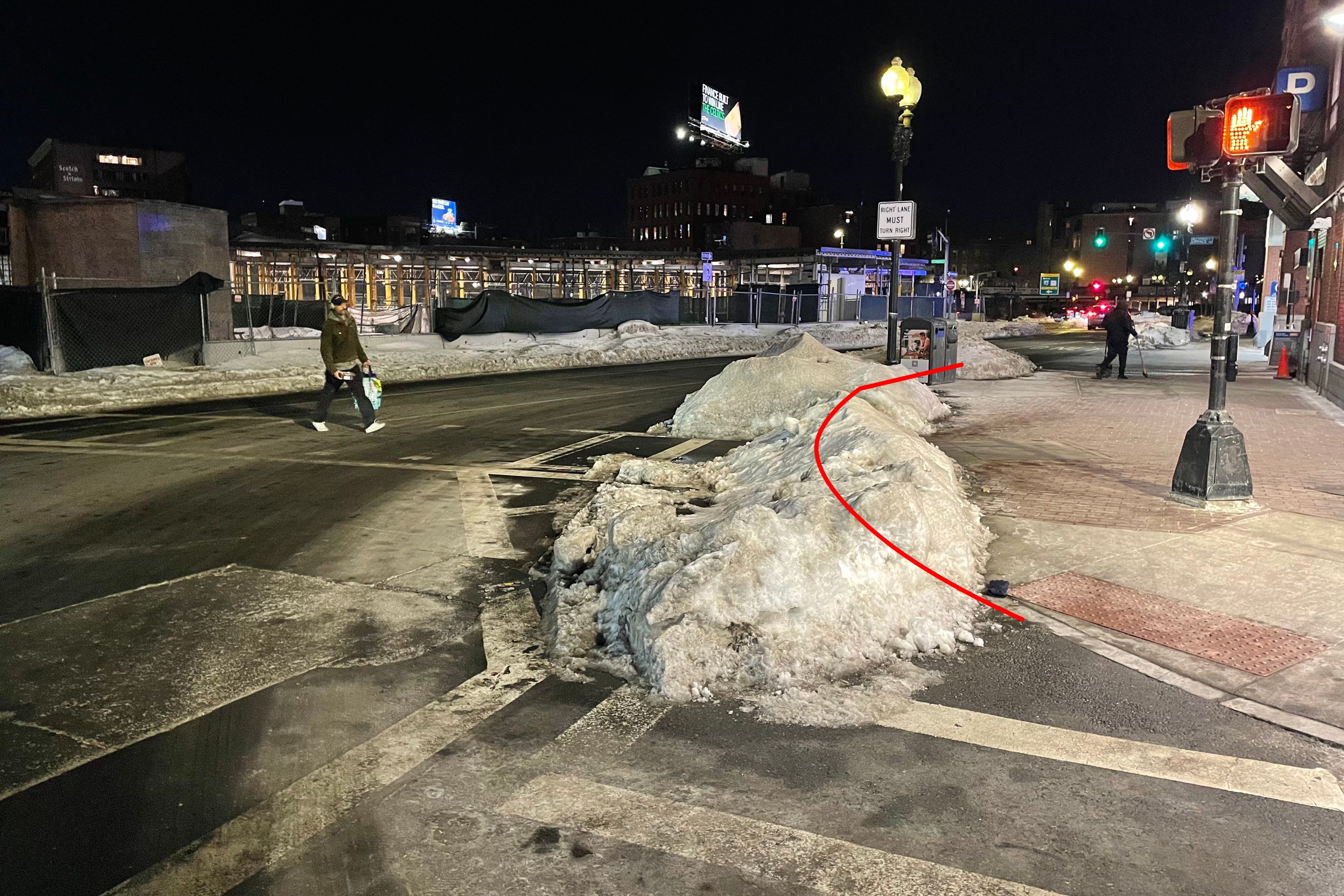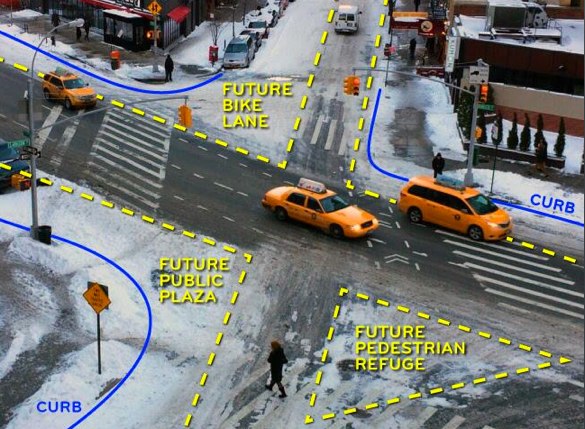According to year-end statistics compiled by the Boston Planning and Development Agency (BPDA), City of Boston planners approved dozens of construction projects in 2021 that could give the city 7,887 new homes, 6 million square feet of new commercial space, and enough parking to store 8,668 more cars.
Nearly three-quarters of that new parking – 6,441 spaces – would be built in transit-accessible neighborhoods within a quarter-mile of an MBTA station.
Over the course of 2021, the BPDA approved 71 new development projects that include a combined total of 17.1 million square feet of real estate inside the city's boundaries.
Most of those new projects include a housing component, either in purely residential apartment buildings, or in mixed-use projects:
2021 BPDA project approvals for mixed-use and residential developments
"TOD" indicates "transit-oriented development" – projects that are located within a quarter-mile of an MBTA rapid transit or commuter rail station. Source: BPDA
| Purely Residential Projects | Total | in TOD | % TOD |
| Number of projects | 29 | 12 | 41% |
| Housing Units | 2,352 | 1,226 | 52% |
| Parking Spaces | 1,114 | 481 | 43% |
| Mixed-Use Projects | Total | in TOD | % TOD |
| Projects | 29 | 20 | 69% |
| Housing Units | 5,535 | 4,550 | 82% |
| Residential sq. ft. | 5,305,476 | 4,390,132 | 83% |
| Commercial sq. ft. | 2,503,372 | 1,364,697 | 55% |
| Parking Spaces | 3,620 | 2,615 | 72% |
Among the 29 purely residential developments that the BPDA approved in 2021, developers plan to build 2,352 new apartments and 1,114 new parking spaces - roughly one parking spot for every 2 apartments.
But among the subset of 12 housing developments that would be located within a quarter-mile of and MBTA rapid transit or commuter rail station, the parking ratio was slightly lower: a total of 481 new parking spaces for 1,226 apartments (about 0.4 spaces per housing unit).
Related:
StreetsblogUSA: Apartments With Free Parking Reduce Transit Ridership
The BPDA also approved 29 mixed-use projects in 2021, and collectively those projects could give Boston approximately 5,535 new homes, 2.6 million square feet of office, retail, and other non-residential space, and 3,620 parking spaces – roughly two parking spaces for every three apartments. However, it's likely that some of those parking spaces will be reserved for the commercial tenants in those buildings.
Compared to past years, the parking-per-home ratio for residential and mixed-use projects has declined.
In 2019, the agency approved 4,762 new homes plus enough parking for 4,773 cars in residential and mixed-use projects – roughly one parking spot for every apartment.
In 2020, that ratio dipped slightly, to about 0.9 parking spots per home.
Related:
Boston Planners Approved Over 11,000 New Parking Spaces in 2020
However, the BPDA's non-residential project approvals in 2021 had considerably more parking associated with them than in prior years.
The agency approved 10 office and lab projects plus three institutional projects that collectively propose to build 3,934 new parking spaces:
2021 BPDA project approvals for commercial and institutional developments
"TOD" indicates projects located in transit-oriented districts. Source: BPDA
| Purely Commercial Projects | |||
|---|---|---|---|
| Total | in TOD | % TOD | |
| Projects | 10 | 8 | 80% |
| Total square footage | 2,178,420 | 1,934,233 | 89% |
| Parking Spaces | 2,454 | 2,368 | 96% |
| Purely Institutional Projects | |||
| Total | in TOD | % TOD | |
| Projects | 3 | 2 | 67% |
| Total square footage | 2,282,252 | 1,816,150 | 80% |
| Parking Spaces | 1,480 | 977 | 66% |
In 2019, the BPDA approved 9 commercial or institutional projects with 2.4 million square feet of space and just 237 new parking spaces. And in 2020, the BPDA approved 2.3 million square feet of non-residential projects that collectively had just 200 parking spaces attached.
This year's surge in non-residential parking garage approvals can be explained in part by the kinds of applicants seeking BPDA approvals in 2021. While many non-residential projects in 2019 and 2020 were associated with universities, which tend to have lower demands for parking, the BPDA's agenda in 2021 included two large hospital expansions that insisted on spending health care dollars on large on-site parking garages.
One of the bigger institutional project approvals this year was the Massachusetts General Hospital expansion near Charles Circle. That project proposes to build a massive six-level underground garage for 977 cars next to the traffic-choked Charles Circle in Boston's West End (the project would also help build a proposed new subway platform for an extension of the MBTA's Blue line).
A handful of the projects that the BPDA approved in 2021 would avoid building any on-site parking whatsoever. The Boston Housing Authority's final phase of development of the Old Colony public housing neighborhood, which the BPDA board approved in April, would replace 208 existing apartments and add 134 additional affordable apartments in three new buildings with no off-street parking at the eastern edge of the neighborhood, adjacent to Moakley Park.
And in Jamaica Plain, a short walk away from the Green Street Orange Line stop, the BPDA approved a new 5-story building (see rendering at the top of this article) that would provide housing for 38 low-income senior households, plus a new street-level restaurant space for El Embajador Restaurant.
However, the owners of the adjacent Turtle Swamp Brewery have sued to block that housing, specifically citing its lack of parking in their complaint.
Partly in response to lawsuits like that one, the BPDA and City of Boston adopted two significant parking reforms late last year that could further reduce the amount of parking that future developments can build.
In late December, Mayor Wu signed a new zoning ordinance that will eliminate minimum parking mandates for residential projects where at least 60 percent of new homes would be are income-restricted for lower- and middle-income households.
And in October, the BPDA adopted new planning guidelines that will impose maximum parking limits for larger developments, with stricter limits applying in the city’s most walkable and transit-accessible neighborhoods.






